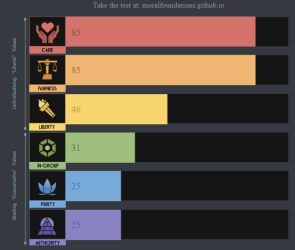The closest to mine so far.
Here is the text of their commentary (which does not seem to be customized by test taker):
"Explanation:
Moral Foundations Theory, developed by psychologists Jonathan Haidt and Craig Joseph, suggests that there are innate and universal psychological foundations underlying human morality:
The CARE foundation is defined by a desire to minimize the suffering of others.
Those who score highly in it are more likely to value tolerance, pacifism, generosity, and mercy.
Care is one of the more commonly held foundations, but happens to be particularly strong among Social Progressives and Cosmpolitans.
The FAIRNESS foundation is defined by a desire for people to be held accountable for their actions in an equal playing field.
Those who score highly in it are more likely to value equality, justice, reciprocity, integrity, and honesty.
Fairness is the most omnipresent foundation, with the vast majority of people scoring highly in it, but happens to be particularly strong among Socialists and Left Liberals (Social Democrats).
The LIBERTY foundation is defined by a desire for people to have agency over their lives without outside coercion.
Those who score highly in it are more likely to value autonomy, privacy, free speech, and voluntarism.
Anarchists, Libertarians and Classic Liberals usually score highest in this category.
The INGROUP-LOYALTY foundation is defined by a desire for members of one's "natural" ingroups (such as their family, tribe, or nation) to forego their personal aspirations and sympathies towards external causes in order to benefit the group. Those who score more highly in it are more likely to value self-sacrifice, national sovreignty, preservation of culture, strength, and patriotism.
Nationalists and Identitarians usually score highest in this category.
The PURITY foundation is defined by a desire to uphold a standard of "high society" and avoid behavior that is percieved as primitive, degenerate, or spiritually degrading.
Those who score highly in it are more likely to value cleanliness, beauty, etiquette, abstinence, chastity, frugality, and spirituality.
Social Conservatives usually score highest in this category, especially those with a religious background.
The AUTHORITY foundation is defined by a desire to achieve stability through a structured social order, and deference to the rules, authorities, and institutions within said order.
Those who score highly in it are more likely to value order, duty, rule of law, discipline, and merit
Social Conservatives usually score highest in this category.
For all inquiries, email
[email protected]"



